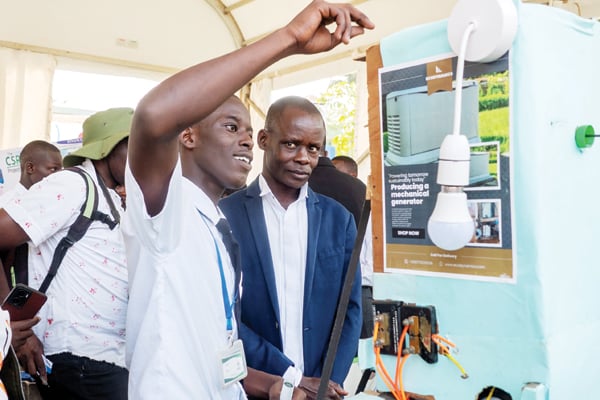Prime
Learners in government schools struggle to master English alphabet

Primary One pupils at Anyeke Primary School, Oyam District, attend a lesson on July 24, 2024. Many children are strggling to learn and comprehend English, the official language in Uganda. PHOTO/BILL OKETCH
What you need to know:
- Children participating in this assessment that will end on Sunday, July 28, 2024 are those in the age bracket of 4-16. At least 29 districts countrywide are taking part in the assessment.
An eight-year-old boy enrolled in Primary One at Anyeke Primary School, a government aided school in Oyam District in 2023 is unable to memorise the English letters of the alphabet.
His father, also an LC1 chairman in Oyam Town Council, expected that within a span of two years of learning, his beloved last born son would be able to remember all the 26 letters of the alphabet.
Now in Primary Two, the child cannot remember more than 80 per cent letters of the alphabet.
He could not remember seven letters: T, M, K, R, Y, D and U out of the 10 sampled letters when his literacy ability was being assessed on Wednesday, July 24.
Sitting on a log under a big mango tree, the boy was unable to memorise the seven letters even after he was offered about five minutes to complete the simple task. He kept on repeating O, B and S.
“Our children go to school but when you ask them simple questions you realise that they’re not learning. We have talked to teachers but nothing has changed,” his father said.
Uwezo Uganda in collaboration with Oyam-based grassroots organisation, Foundation for Inclusive Community Help (FICH), organised an assessment on literacy and numeracy, as well as other competencies that enable children to excel in academics for Uganda to realise good learning outcomes.
Children participating in this assessment that will end on Sunday, July 28, 2024 are those in the age bracket of 4-16. At least 29 districts countrywide are taking part in the assessment.
The most recent assessment was conducted in 2021. Ms Victoria Harriet Anyango, Uwezo district coordinator for Oyam, said the results of the 2021 assessment were very worrying results.
She said more than half of Primary Six pupils assessed were unable to read and write a Primary Two level story.
“So, we want to know right now again with this 2024 assessment what has changed. Has the government acted upon the results that we produced in 2021, or has everything remained the same?” she told this publication in an interview on Wednesday.
This household based assessment is also being conducted in selected schools.
“We are taking the enrollment and attendance of children in class. We want to know if these children who enroll in year one attend school frequently as they are supposed to, and then we want to know whether the school facilities are in a good state for learning, and then after that we go to the communities and assess children at household level,” Ms Anyango said.
However, without preempting the results of their assessment, assessors said their interaction with the children paints a bleak future for learners.
“Most of the children that we are assessing are unable to recongnise letters of the alphabet and yet they are already in Primary Four and Primary Five. Most of the pupils we are assessing are unable to do Primary Two level mathematics and yet these children are already in upper classes beyond Primary Two,” Anyango said.
“So, it is kind of worrying but I wouldn’t want to preempt the results of the assessment,” she added.
Mr Moses Otim, the head teacher of Anyeke Primary School, said they are trying to teach pupils literacy one and two.
He said there is a remarkable improvement in literacy.
“Our learners are now able to read text in English, they’re now able to converse in English and they’re able to do examinations set in English. In terms of academic performance, actually we are trying to improve much as we have not yet reached our expected target,” the head teacher said.
“You know learning is a gradual process and change does not come in one day, but we are trying. Like in last year’s Primary Leaving Examinations (PLE) performance, one child got first grade, 47 in second grade out of 105 candidates that sat compared to the previous year of 2022.
At Anyeke Primary School, one pupil managed to score first grade and 17 scored second grade out of 111 candidates that sat PLE in 2022.
Mr Otim is, however, optimistic that with strategies put in place by his administration, more candidates are going to fetch first grade in PLE this year.
“I have talked to the teachers about the issues of giving the learners extra lessons so as to help us cover the syllabus. Secondly, we have also put in place continuous assessment of learners,” Mr Otim added.
“This time round, the term is almost ending and we have already covered the syllabus. So, we have embarked on giving continuous assessment, and when you look at the performance, you see that there is some improvement.”
Challenges
Just like Anyeke, 109 government-aided primary schools in Oyam cannot provide lunch meals for all learners that makes them to escape from school when hunger strikes. Other challenges include, among others, parents’ negative attitude towards education, automatic promotion, inadequate teachers and desks.
For instance, Anyeke with a total enrollment of 1,781 pupils (903 girls and 878 boys) has only 17 teachers out of the required 32 teachers.




